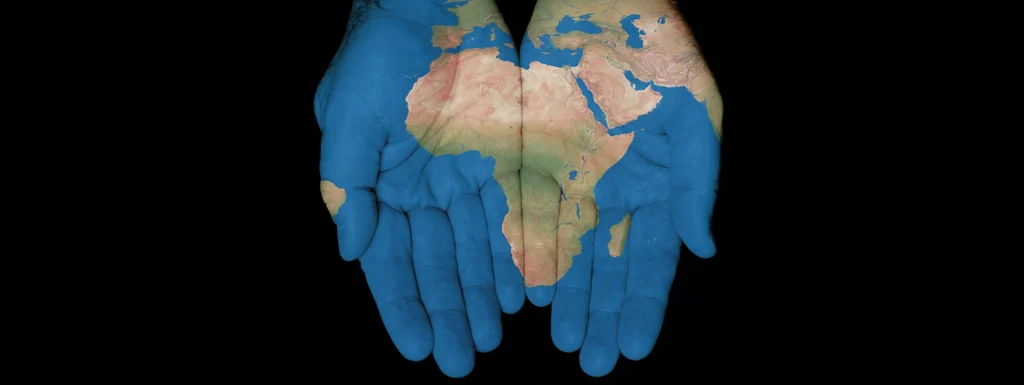More than 50 African countries in the African Continental Free Trade Area (AfCFTA) are turning to blockchain and stablecoins to double intra-African trade and unlock a $70 billion opportunity.
Known as the AfCFTA Digital Access and Public Infrastructure for Trade Initiative, or ADAPT, the new program will cover secure digital identity, instant electronic payments and reliable data access, integrated into a single digital public infrastructure for the 54 AfCFTA signatories.
The new initiative is led by the African Union through the AfCFTA, with the World Economic Forum (WEF) and the Tony Blair Institute for Global Change also involved in its development.
Despite a $3 trillion economy and a population expected to make up 40 percent of the world’s population by the end of the century, Africa remains a small player in international trade. According to the WEF, it represents only 2% of global trade.
Additionally, Africa is extremely dependent on trade with other regions. Intra-African trade represents only a fifth of the continent’s total trade volume.
The slow pace of digitalization has been one of the main obstacles to this local trade. Relying on paper systems increases costs and slows down logistics; one study estimates that African countries lose $25 billion a year in cross-border fees.
ADAPT targets this sector with blockchain-based business solutions that instantly settle transactions and digitize processes, supply chains and payments.
“This initiative is the cornerstone of our vision to create an inclusive and integrated continental market. It is Africa’s model for the digitalization and modernization of trade: a system that replaces fragmentation with integration, friction with trust and inefficiency with scale,” commented Wamkele Mene, Secretary General of the AfCFTA.
ADAPT will digitize business processes, “ultimately transforming the way African economies connect and collaborate,” added Chido Munyati, head of Africa at the WEF.

One of the pillars of ADAPT will be digital identity, an area in which Africa has made significant progress in recent years. From Nigeria’s ongoing efforts to enroll 180 million citizens on a digital ID card by the end of 2026, to Ethiopia’s Fayda program targeting 90 million enrollments over the next two years, African countries are ramping up their digital identity efforts.
The initiative also aims to unify Africa’s disparate payment systems. Most countries now have thriving digital payment and mobile money systems, but these remain confined to national borders. Intra-African payments still rely on the US dollar and correspondent banks, many of which are based in Europe and North America.
ADAPT will integrate stablecoins into these payment systems, facilitating cross-border payments, reducing fees and providing 24-hour availability.
It “establishes a reliable, interoperable infrastructure – an Africa-built backbone for digital identity, documentation, payments and data exchange – enabling goods, services and capital to flow with the efficiency the 21st century demands,” Mene commented.
The initiative will be launched in 2026 in Kenya, Ghana and a third country that has not yet been named. It will then extend to other countries, with a continental deployment by 2035.
Egypt to offer 400,000 homes under digital program
In Egypt, the government is set to offer up to 400,000 homes on a new digital platform as part of its efforts to modernize its real estate sector.
The new units will be offered on the official Egyptian real estate platform, a digital platform that simplifies access to the real estate market in this North African country.
According to Ahmed Elbatrawy, who chairs the initiative, the platform is much more than a digitization effort; it is “the rise of a new Egyptian institution that is reshaping the future of the real estate and technology sectors.”
The platform was launched earlier this year as part of the government’s efforts to introduce transparency into a sector expected to reach $30 billion by 2033. The government also expects the platform to spark explosive growth by opening the local market to millions of global real estate investors.
Egypt has already offered 25,000 units to its citizens using the platform and, according to Elbatrawy, its performance is on par with the world’s leading platforms.
“Egypt is building a global ownership system. We are forming an Egyptian institution capable of leading the region, creating transparency and shaping a future that reflects the ambitions of the state and its young talents.”
Watch: Africans should start owning their data
title=”YouTube Video Player” frameborder=”0″ allow=”accelerometer; autoplay; write to clipboard; encrypted media; gyroscope; picture-in-picture; web sharing” referrerpolicy=”strict-origin-when-cross-origin” allowfullscreen=””>




